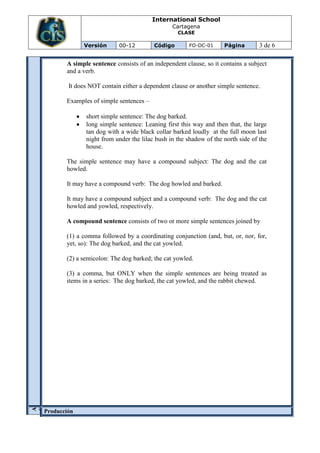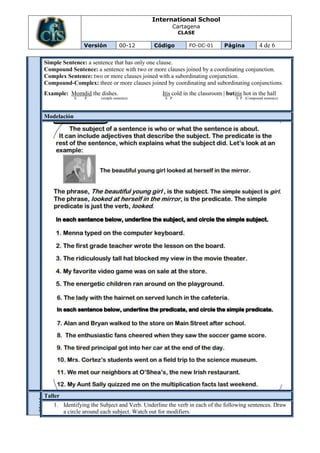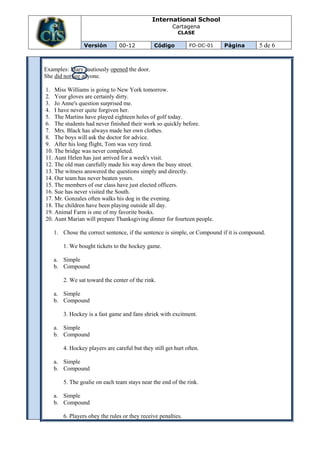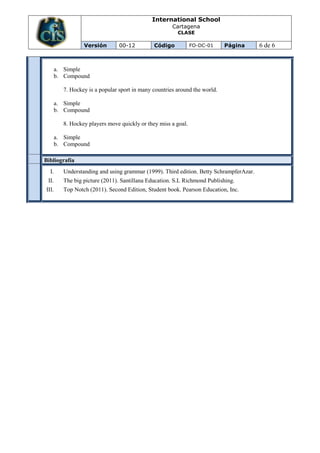The document discusses identifying subjects and predicates in simple and compound sentences. It provides examples of sentences labeled with the subject and predicate. It explains that the subject is what the sentence is about and the predicate tells something about the subject. The document also defines simple sentences as having one independent clause, compound sentences as having two or more clauses joined by a conjunction, and complex sentences as having one main clause and one or more subordinate clauses.
![International School
Cartagena
CLASE
Versión 00-12 Código FO-DC-01 Página 1 de 6
Área: English Asignatura: English Curso: 6th
Fecha: 11 al 17-02 Periodo: I Nº Hor: 12hr Semana: 4
Tema: Kinds of Sentences. Subjects & Predicates.Compound Subjects &
Predicates.Simple & Compound Sentences
Indicador Students will be able to identify the subject and predicate in a simple or
de Logro compound sentences.
Exploración Identify the subject and predicate in a simple or compound
sentences.
Contextualización
Every complete sentence contains two parts: a subject and a predicate. The subject is what (or
whom) the sentence is about, while the predicate tells something about the subject. In the following
sentences, the predicate is enclosed in braces ({}), while the subject is highlighted.
Judy {runs}.
Judy and her dog {run on the beach every morning}.
To determine the subject of a sentence, first isolate the verb and then make a question by placing
"who?" or "what?" before it -- the answer is the subject.
The audience littered the theatre floor with torn wrappings and spilled popcorn.
The verb in the above sentence is "littered." Who or what littered? The audience did. "The audience" is
the subject of the sentence. The predicate (which always includes the verb) goes on to relate something
about the subject: what about the audience? It "littered the theatre floor with torn wrappings and spilled
popcorn."
Conceptualización
Subject and Predicate
The most familiar grammatical function is the SUBJECT. In notional
terms, we can think of the Subject as the element which performs the
EMOCIÓN
"action" denoted by the verb:
[1] David plays the piano](https://image.slidesharecdn.com/formatoplano6thweek4-130112154126-phpapp02/85/Formato-plano-6th-week4-1-320.jpg)
![International School
Cartagena
CLASE
Versión 00-12 Código FO-DC-01 Página 2 de 6
[2] The police interviewed all the witnesses
In [1], the Subject David performs the action of playing the piano. In
[2], the Subject the police performs the action of interviewing all the
witnesses. In these terms, this means that we can identify the Subject
by asking a wh-question:
[1] David plays the piano
Q. Who plays the piano?
A. David ( = Subject)
[2] The police interviewed all the witnesses
Q. Who interviewed all the witnesses?
A. The police (= Subject)
Having identified the Subject, we can see that the remainder of the
sentence tells us what the Subject does or did. In [1], for
example, plays the piano tells us what David does. We refer to this
string as the PREDICATE of the sentence. In [2], the Predicate
is interviewed all the witnesses.
Here are some more examples of sentences labelled for Subject and
Predicate.
Subject Predicate
Thelion roared
He writeswell
She enjoys going to the cinema
The girl in the blue dress arrived late
In each of these examples, the Subject performs the action described
in the Predicate. We've seen, however, that there are problems in
defining verbs as "action" words, and for the same reasons, there are
problems in defining the Subject as the "performer" of the action. The
Subject inJohn seems unhappy is John, but we would hardly say he is
performing an action.
TYPES OF SENTENCES](https://image.slidesharecdn.com/formatoplano6thweek4-130112154126-phpapp02/85/Formato-plano-6th-week4-2-320.jpg)



